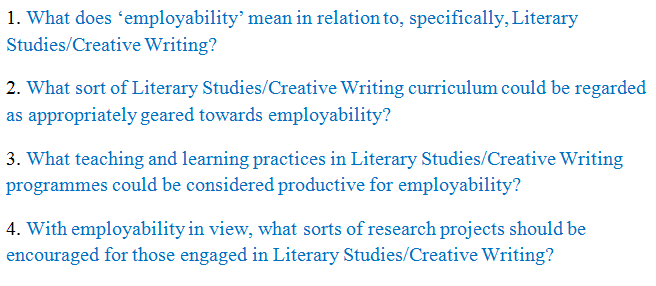Employability and Literary Studies/Creative Writing
Workshop 2: Preamble, Questions, Programme

Date: 3 August 2017, 9:30 am to 5:30 pm
Venue: SCR, Froebel College, University of Roehampton, London
Preamble
The slightly awkward word ‘employability’ (with that suffix) has been a cornerstone of British education policy since the late 1990s. The tilt of the suffix is significant: ‘employable’ suggests that a person’s fitness for a specific kind of employment is perceived by another; ‘employability’ suggests that a person is imbued with a quality that makes him/her fit for employment in general (this person can claim to be possessed of such a quality). A consensus, at least in governmental and corporate circles, about how the term should be defined for higher-education-policy purposes appeared in the early noughties, principally through the efforts of Mantz Yorke and Peter Knight (especially in two co-authored volumes, 2003 and 2004). The consensus is marked by frequent references to their definitions in policy documents. They proposed, in fact, two slightly different definitions:

These definitions had the advantage of being practical for policy-making and ‘evidenced’ in a policy-centred sense, as well as upbeat in tone. Other research publications of the time were sometimes doubtful of such definitions or sceptical of the import of the word itself. A Policy Research Institute LMU/ Joseph Rowntree Foundation report (Johnson and Burden 2003), for instance, considered several contradictory and somewhat anxious definitions from the late 1990s and left the matter there. A paper by Brown, Hesketh and Williams (2003) – and more elaborately their book (2004) – drew attention to the ideological implications of the term. In brief, the argument was that the term appeared to put the responsibility for being employed or unemployed on individual jobseekers/graduates and educators; and the term thus effectively drew attention away from the broader features of the employment market and the politico-economic system it reflects. Narrow individual responsibility is pushed in using the term so as to distract from social concern, economic factors and political awareness. The answer to that from policy-makers (such as Yorke) has been that Brown, Hesketh and Williams were confusing the conditions of ‘employment’ with the quality of ‘employability’: the former has a bearing on the latter, but insofar as the structures and tasks of higher education go the focus has to be on the latter and not the former.
In the decade since then, the policy discourse of higher education at both the national level and within institutions – HEIs (Higher Education Institutions) or HEPs (Higher Education Providers) – has gradually come to be centred on employability. Instilling employability in graduates has gradually become the key function of higher education and the responsibility of HEIs. This discourse is powerfully invested in developing ‘skills’, as distinct from cultivating ‘knowledge’ as conceived through the historical development of the modern university. ‘Skills’ and ‘knowledge’ are now often used as interchangeable or mutually-implicated in policy documents. As this one-day workshop is undertaken, in 2017, far-reaching changes in the higher education sector, affecting all levels, are being legislated and institutionalised in Britain -- at both the national level (see the UK Government’s white paper, DBIS 2016) and within HEIs.
Workshop Questions
The preamble raises several general questions with regard to employability which will, no doubt, simmer in the background of discussions and may come to the fore:

The workshop is, however, addressed to a narrower domain of employability: in relation to Literary Studies and Creative Writing. Pedagogic and scholarly programmes in both feature in numerous British HEIs at present, usually within a common institutional space or in related institutional spaces (departments or schools or research Units-of-Assessment). Presentations in the workshop will directly address questions such as:

Two sessions of the workshop will be devoted to discussing these questions for, respectively, Literary Studies and Creative Writing.
This workshop is part of a Newton Grant funded project entitled Entrepreneurial Literary Research, a collaboration between the Open University, UK, and the State University of Campinas, Brazil. A third session of the workshop will consist in responses to the first two from perspectives grounded in a higher education context that is, in various ways, quite different from Britain’s: that of Brazilian academics and students.
Programme
Tea/coffee served from 9:00
Session 1: Creative Writing and Employability (9:30-12:00)
9:30-11:00: Presentations by
- Steve May, Bath Spa University
- Susan Greenberg, Roehampton University
- Derek Neale, Open University
11:00-12:00: Discussion
12:00-13:00: Lunch break
Session 2: Literary Studies and Employability (13:00-15:30)
13:00-14:30: Presentations by
- Stephen Longstaffe, University of Cumbria
- Suman Gupta, Open University
- Fabio Akcelrud Durão, University of Campinas
14:30-15:30: Discussion
15:30-16:00: Tea/coffee break
Session 3: Responses
16:00-16:40: Responses to workshop discussions by
- Leandro Pasini, Federal University of Sao Paulo
- Renan Salmistraro/Fernando Urueta/Elisa Pagan, University of Campinas
16:40-17:30: Discussion
References
Brown, Phillip, Anthony Hesketh and Sara Williams (2003). “Employability in a Knowledge-driven Economy”. Journal of Education and Work 16: 2, June. 107-26.
Brown, Phillip, Anthony Hesketh and Sara Williams (2004). The Mismanagement of Talent: Employability and Jobs in the Knowledge Economy. Oxford: Oxford University Press.
DBIS (Department of Business, Innovations and Skills), UK Government (2016). Success as a Knowledge Economy: Teaching Excellence, Knowledge Economy and Student Choice. London: Higher Education Reform Directorate, Departmeent for Business, Innovation and Skills.
Johnson, Steve and Tom Burden (2003). Young people, employability and the induction process. York: Joseph Rowntree Foundation, with Policy Research Institute, Leeds Metropolitan University.
Knight, Peter K. and Mantz Yorke (2003). Assessment, Learning and Employability. Maidenhead Berks.: Open University Press and the Society for Research in HE.
Knight, Peter K. and Mantz Yorke (2004). Learning, Curriculum and Employability in Higher Education. London: Routledge Falmer.
Yorke, Mantz (2004). Employability in higher education: what it is – what it is not. York: LTSN Generic Centre and ESECT.